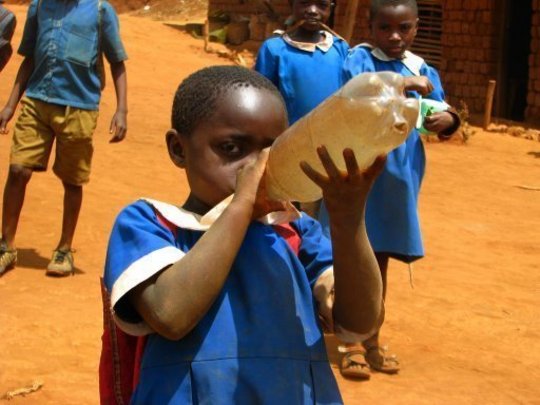But if water is so important, shouldn't everyone be able to have access to clean water? Unfortunately, no. There are roughly 7 billion people on this planet. But not all of them got access to safe water. In fact, it is estimated that 783 million individuals on Earth are using dirty water for everything from bathing, washing, to drinking. That is about 10% of our entire population who have to use dirty water to live. In some cases, people, mostly girls and women, have to walk for miles to get clean water back to their families using a container. These journeys are usually quite dangerous, and could potentially took their lives. But since they don't have access to clean water, they are willing to risk their lives so their families can have safe water to use.
So then what is it that make them willing to risk their lives to bring home clean water? For many people, it's because of their children. Even though the risk is high, the body of an adult can survive after consuming dirty water because their immune system is strong. But for little children and babies, their fragile body is not strong enough to protect them against unsanitary water. By using unclean water, they can be vulnerable to a handful of diseases and sicknesses. One of which is diarrhea.
Diarrhea is the second leading cause of child death in the world today. Because of poor sanitation, hygiene, or dirty drinking water, diarrhea took the lives of 700,000 children every year (that's almost 2000 children per day). What is more shocking is that diarrhea killed more children in the last decade than all armed conflicts have done since the World War II. If that sound bad to you, this next fact is going to sound even worse: dirty water killed more children than war, malaria, HIV/AIDS, and traffic accidents combined. So now you know why is it that people are willing to risk their lives for clean water; it's so that their children can live.
Now that we've understood the effects of using unsafe water, let's talk about where it came from. Out of every medical cases related to usage of unsanitary water, most of the victims lived in developing countries. And since these countries don't have a lot of money to spend on processing dirty water, most of it just went straight into streams or rivers. In fact, 90 percent of waste-water produced in underdeveloped countries is discharged untreated into local waters. And since most of the natives don't have access to clean water, they were forced to use dirty, contaminated waters from rivers.
So what can we do to help? In every blogs that I've created, whenever it comes to this part of the blogs, I've always used these plain, uncreative, restricted, and, to be honest, lazy ways in which we can help solving world problems. It's always either "donate to this charity/foundation" or "let people know about this issue so everyone can be aware of how serious it can be. But after a while I decided that it's not going to do any good.
So now I'm trying a new approach in which we can participate in solving these global issues. The main focus of my approach is that "everything matters". So from now on, any time you read mine or anyone else' blogs about global issues, if you are interested in or are willing to help, you can think about what you can do to solve the world issue that you're interested in. Be brave and think of a way that you can lend a hand in solving these world problems. What you do ,no matter how big or small, will be very helpful to society. So don't be afraid and just try your best to do what you think is helpful for the world. And don't think that what you do is meaningless. Because any action, no matter how little and insignificant it may be, if repeated enough, will make a change in society.
Ps: Just don't do anything that is considered illegal or you're going to get in trouble.
Why is water important? : http://science.howstuffworks.com/environmental/earth/geophysics/water-vital-to-life.htm
Water facts: http://blueplanetnetwork.org/water/
http://www.foodandwaterwatch.org/water/interesting-water-facts/
http://water.org/water-crisis/water-facts/water/
http://www.compassion.com/poverty/water.htm











